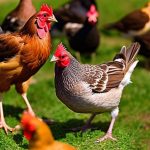Urban chicken keeping has gained popularity in recent years as city residents seek to establish a closer connection to their food sources and adopt more sustainable lifestyles. This practice provides urban dwellers with access to fresh eggs and potentially their own meat supply. Chickens also offer natural pest control and contribute to composting efforts, making them valuable assets in urban gardens.
While keeping chickens in cities may seem unconventional, it offers a rewarding experience that allows individuals to reconnect with nature and increase their self-sufficiency. However, urban chicken keeping presents certain challenges. City residents must comply with local regulations and consider the potential impact on their community.
Despite these obstacles, the benefits of urban chicken keeping are significant. With proper knowledge and preparation, it is feasible to successfully raise chickens in an urban environment. This practice continues to grow in popularity as more people recognize its potential for enhancing sustainability and food security in urban areas.
Table of Contents
- 1 Regulations and Guidelines for Keeping Chickens in the City
- 2 Benefits of Keeping Chickens in an Urban Setting
- 3 Challenges of Urban Chicken Keeping
- 4 Tips for Raising Chickens in a City Environment
- 5 Community Impact of Urban Chicken Keeping
- 6 Resources for City Dwellers Interested in Keeping Chickens
- 7 FAQs
- 7.1 What are the regulations for keeping chickens in the city of Woodland?
- 7.2 Do I need a permit to keep chickens in the city of Woodland?
- 7.3 What are the requirements for obtaining a permit to keep chickens in the city of Woodland?
- 7.4 Are there any restrictions on where I can keep chickens on my property in the city of Woodland?
- 7.5 What are the penalties for violating the regulations for keeping chickens in the city of Woodland?
Key Takeaways
- Urban chicken keeping is a growing trend in cities, allowing residents to raise chickens for eggs and companionship.
- Regulations and guidelines for keeping chickens in the city vary by location and it’s important to research and follow local laws.
- Keeping chickens in an urban setting can provide fresh eggs, natural pest control, and a connection to food production.
- Challenges of urban chicken keeping include limited space, noise concerns, and potential conflicts with neighbors.
- Tips for raising chickens in a city environment include providing adequate space, proper nutrition, and regular health check-ups for the birds.
- Urban chicken keeping can have a positive impact on the community by promoting sustainability and providing educational opportunities.
- Resources for city dwellers interested in keeping chickens include local urban farming organizations, online forums, and books on urban chicken keeping.
Regulations and Guidelines for Keeping Chickens in the City
Understanding Local Regulations
Before embarking on the journey of urban chicken keeping, it is essential to familiarize oneself with the regulations and guidelines set forth by local authorities. Many cities have specific ordinances regarding the keeping of chickens, including restrictions on the number of chickens allowed, coop size and placement, and noise regulations. It is important to research and understand these regulations to ensure compliance and avoid any potential legal issues.
Considering the Impact on Neighbors and Community
In addition to local regulations, it is also important to consider the impact of keeping chickens on neighbors and the surrounding community. Communicating with neighbors and addressing any concerns they may have can help foster a positive relationship and minimize potential conflicts.
Enjoying the Benefits of Urban Chicken Keeping Responsibly
By being a responsible chicken keeper and following local guidelines, city dwellers can enjoy the benefits of urban chicken keeping while being considerate of their community.
Benefits of Keeping Chickens in an Urban Setting
There are numerous benefits to keeping chickens in an urban setting. One of the most obvious benefits is the availability of fresh eggs. Urban chicken keepers can enjoy a daily supply of nutritious, organic eggs that are free from hormones and antibiotics.
In addition to eggs, chickens also provide high-quality fertilizer for gardens, helping urban gardeners grow healthy and abundant produce. Chickens are also excellent at pest control, as they naturally forage for insects and other pests. This can be particularly beneficial in urban environments where pests such as slugs and snails can wreak havoc on gardens.
Furthermore, chickens are great composters, turning kitchen scraps and yard waste into valuable fertilizer for gardens. By keeping chickens in the city, urban dwellers can reduce their environmental impact and live a more sustainable lifestyle.
Challenges of Urban Chicken Keeping
While there are many benefits to urban chicken keeping, there are also several challenges that city dwellers must consider. One of the primary challenges is space limitations. Urban environments often have limited outdoor space, making it essential to carefully plan and design a coop and run that will provide adequate space for chickens to roam and forage.
Another challenge is noise management. Roosters can be particularly noisy, and many cities have ordinances prohibiting their keeping due to noise concerns. Even hens can be noisy at times, especially when laying eggs or when disturbed by predators.
It is important for urban chicken keepers to be mindful of noise levels and take steps to minimize disturbances to neighbors.
Tips for Raising Chickens in a City Environment
Raising chickens in a city environment requires careful planning and consideration of the unique challenges that urban settings present. One important tip is to invest in a well-designed coop and run that maximizes space efficiency while providing adequate room for chickens to move around and forage. Additionally, it is important to provide enrichment activities such as perches, dust baths, and toys to keep chickens mentally stimulated and physically active.
Another important tip is to be mindful of noise management. Choosing quiet breeds of chickens and avoiding roosters can help minimize noise disturbances to neighbors. Additionally, providing a well-insulated coop can help reduce noise levels and provide a comfortable environment for chickens.
Community Impact of Urban Chicken Keeping

Building a Sense of Community
On the positive side, urban chicken keeping can foster a sense of community and connection among neighbors. By sharing fresh eggs, participating in community garden projects, and educating others about sustainable living, urban chicken keepers can positively impact their community.
Potential Drawbacks
However, it is essential to be aware of potential negative impacts. Noise disturbances, unpleasant odors from chicken waste, and attracting pests are all concerns that can affect neighbors and the surrounding community.
Being a Responsible Chicken Keeper
By being proactive in addressing these concerns and being a responsible chicken keeper, urban dwellers can minimize negative impacts and foster positive relationships within their community.
Resources for City Dwellers Interested in Keeping Chickens
For city dwellers interested in keeping chickens, there are numerous resources available to help them get started. Local agricultural extension offices often provide information on local regulations and guidelines for keeping chickens, as well as resources for building coops and caring for chickens. Additionally, there are many online communities and forums where urban chicken keepers can connect with others, share experiences, and seek advice.
There are also numerous books and publications available that provide comprehensive information on all aspects of chicken keeping, from choosing breeds to building coops to caring for chickens’ health. Attending workshops or classes on urban chicken keeping can also be a valuable resource for learning from experienced chicken keepers and gaining hands-on experience. In conclusion, urban chicken keeping offers numerous benefits for city dwellers seeking a more sustainable lifestyle.
By understanding local regulations, addressing potential challenges, and being mindful of the impact on the community, urban chicken keepers can enjoy the rewards of fresh eggs, natural pest control, and a deeper connection to their food sources. With careful planning and consideration, raising chickens in an urban environment can be a fulfilling and rewarding experience for both individuals and their communities.
If you’re interested in learning more about keeping chickens in an urban environment, you might want to check out this article on creating a garden chicken coop here. It offers tips and ideas for incorporating chickens into your backyard while maintaining a beautiful garden space.
FAQs
What are the regulations for keeping chickens in the city of Woodland?
In the city of Woodland, residents are allowed to keep up to six chickens on their property. Roosters are not allowed.
Do I need a permit to keep chickens in the city of Woodland?
Yes, residents are required to obtain a permit from the city before keeping chickens on their property.
What are the requirements for obtaining a permit to keep chickens in the city of Woodland?
To obtain a permit, residents must meet certain requirements, such as providing a suitable coop and run for the chickens, ensuring proper waste management, and obtaining written consent from neighbors.
Are there any restrictions on where I can keep chickens on my property in the city of Woodland?
Chickens must be kept in the rear yard of the property and must be at least 20 feet from any neighboring residence.
What are the penalties for violating the regulations for keeping chickens in the city of Woodland?
Violating the regulations for keeping chickens in the city of Woodland can result in fines and the revocation of the chicken permit.
Meet Walter, the feathered-friend fanatic of Florida! Nestled in the sunshine state, Walter struts through life with his feathered companions, clucking his way to happiness. With a coop that’s fancier than a five-star hotel, he’s the Don Juan of the chicken world. When he’s not teaching his hens to do the cha-cha, you’ll find him in a heated debate with his prized rooster, Sir Clucks-a-Lot. Walter’s poultry passion is no yolk; he’s the sunny-side-up guy you never knew you needed in your flock of friends!







